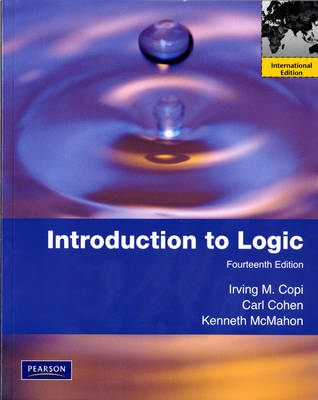
Introduction to Logic
Pearson Education (US) (Verlag)
978-0-205-02447-6 (ISBN)
- Titel ist leider vergriffen;
keine Neuauflage - Artikel merken
Irving M. Copi was a philosopher and logician. He taught at the University of Illinois, the United States Air Force Academy, Princeton University, and the Georgetown University Logic Institute, before teaching logic at the University of Michigan, 1958-69, and at the University of Hawaii, 1969-90. His other works include Essentials of Logic, Informal Logic, and Symbolic Logic. Carl Cohen is Professor of Philosophy at the Residential College of the University of Michigan. He has published many essays in moral and political philosophy in philosophical, medical, and legal journals. He has served as a member of the Medical School faculty of the University of Michigan, and as Chairman of the University of Michigan faculty, where he has been an active member of the philosophy faculty since 1955. His other works include The Animal Rights Debate (Rowman and Littlefield, 2001), with Prof. Tom Regan; he is also the author of Democracy (Macmillan, 1972); the author of Four Systems (Random House, 1982); the editor of Communism, Fascism, and Democracy (McGraw Hill, 1997); the co-author (with J. Sterba) of Affirmative Action and Racial Preference (Oxford, 2003) Kenneth D. McMahon studied physics, philosophy, and English Literature as an undergraduate, then took graduate degrees in psychology and philosophy. He has taught critical thinking, philosophy, statistics, and psychology, and currently teaches logic for Hawaii Pacific University. His professional interests include logic, epistemology, philosophy of science, and philosophy of mind, as well as cognitive science, psychometrics, computational theories of mind, and evolutionary psychology.
Foreward Preface Acknowledgments PART I LOGIC AND LAGUAGE SECTION A REASONING Chapter 1 Basic Logical Concepts 1.1 What Logic Is 1.2 Propositions and Arguments 1.3 Recognizing Arguments 1.4 Arguments and Explanations 1.5 Deductive and Inductive Arguments 1.6 Validity and Truth Chapter 2 Analyzing Arguments 2.1 Paraphrasing Arguments 2.2 Diagramming Arguments 2.3 Complex Argumentative Passages 2.4 Problems in Reasoning SECTION B INFORMAL LOGIC Chapter 3 Language and Definitions 3.1 Language Functions 3.2 Emotive Language, Neutral Language, and Disputes 3.3 Disputes and Ambiguity 3.4 Definitions and Their Uses 3.5 The Structure of Definitions: Extension and Intension 3.6 Definition by Genus and Difference Chapter 4 Fallacies 4.1 What Is a Fallacy? 4.2 Classification of Fallacies 4.3 Fallacies of Relevance 4.4 Fallacies of Defective Induction 4.5 Fallacies of Presumption 4.6 Fallacies of Ambiguity Part II Deduction Section A Classical Logic Chapter 5 Categorical Propositions 5.1 The Theory of Deduction 5.2 Classes and Categorical Propositions 5.3 The Four Kinds of Categorical Propositions 5.4 Quality, Quantity, and Distribution 5.5 The Traditional Square of Opposition 5.6 Further Immediate Inferences 5.7 Existential Import and the Interpretation of Categorical Propositions 5.8 Symbolism and Diagrams for Categorical Propositions Chapter 6 Categorical Syllogisms 6.1 Standard-Form Categorical Syllogisms 6.2 The Formal Nature of Syllogistic Argument 6.3 Venn Diagram Technique for Testing Syllogisms 6.4 Syllogistic Rules and Syllogistic Fallacies 6.5 Exposition of the Fifteen Valid Forms of the Categorical Syllogism Appendix: Deduction of the Fifteen Valid Forms of the Categorical Syllogism Chapter 7 Syllogisms in Ordinary Language 7.1 Syllogistic Arguments 7.2 Reducing the Number of Terms to Three 7.3 Translating Categorical Propositions into Standard Form 7.4 Uniform Translation 7.5 Enthymemes 7.6 Sorites 7.7 Disjunctive and Hypothetical Syllogisms 7.8 The Dilemma Section B Modern Logic Chapter 8 Symbolic Logic 8.1 Modern Logic and Its Symbolic Language 8.2 The Symbols for Conjunction, Negation, and Disjunction 8.3 Conditional Statements and Material Implication 8.4 Argument Forms and Refutation by Logical Analogy 8.5 The Precise Meaning of "Invalid" and "Valid" 8.6 Testing Argument Validity Using Truth Tables 8.7 Some Common Argument Forms 8. 8 Statement Forms and Material Equivalence 8.9 Logical Equivalence 8.10 The Three "Laws of Thought" Chapter 9 Methods of Deduction 9.1 Formal Proof of Validity 9.2 The Elementary Valid Argument Forms 9.3 Formal Proofs of Validity Exhibited 9.4 Constructing Formal Proofs of Validity 9.5 Constructing More Extended Formal Proofs 9.6 Expanding the Rules of Inference: Replacement Rules 9.7 The System of Natural Deduction 9.8 Constructing Formal Proofs Using the Nineteen Rules of Inference 9.9 Proof of Invalidity 9.10 Inconsistency 9.11 Indirect Proof of Validity 9.12 Shorter Truth-Table Technique Chapter 10 Quantification Theory 10.1 The Need for Quantification 10.2 Singular Propositions 10.3 Universal and Existential Quantifiers 10.4 Traditional Subject-Predicate Propositions 10.5 Proving Validity 10.6 Proving Invalidity 10.7 Asyllogistic Inference Part III Induction Section A Analogy and Causation Chapter 11 Analogical Reasoning 11.1 Induction and Deduction Revisited 11.2 Argument by Analogy 11.3 Appraising Analogical Arguments 11.4 Refutation by Logical Analogy Chapter 12 Causal Reasoning 12.1 Cause and Effect 12.2 Causal Laws and the Uniformity of Nature 12.3 Induction by Simple Enumeration 12.4 Methods of Causal Analysis 12.5 Limitations of Inductive Techniques Section B Science and Probability Chapter 13 Science and Hypothesis 13.1 Scientific Explanation 13.2 Scientific Inquiry: Hypothesis and Confirmation 13.3 Evaluating Scientific Explanations 13.4 Classification as Hypothesis Chapter 14 Probability 14.1 Alternative Conceptions of Probability 14.2 The Probability Calculus 14.3 Probability in Everyday Life Appendix Solutions to Selected Exercises Glossary/Index
| Erscheint lt. Verlag | 17.12.2010 |
|---|---|
| Zusatzinfo | Illustrations (some col.) |
| Verlagsort | Upper Saddle River |
| Sprache | englisch |
| Maße | 201 x 250 mm |
| Gewicht | 1032 g |
| Themenwelt | Geisteswissenschaften ► Philosophie ► Logik |
| ISBN-10 | 0-205-02447-5 / 0205024475 |
| ISBN-13 | 978-0-205-02447-6 / 9780205024476 |
| Zustand | Neuware |
| Haben Sie eine Frage zum Produkt? |
aus dem Bereich


